
views
X
Research source
Whether you’re feeding yourself or a whole car full of kids, with a little planning and a few secret strategies, you’ll be eating cheaply and deliciously! We've got 15 ways to help you save money on food while you’re on the road.
Stock up on non-perishable snacks.
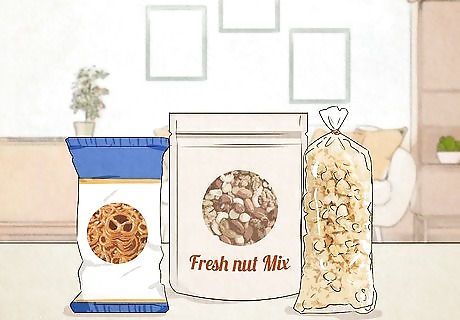
Satisfy your cravings, but skip the overpriced gas station snacks. You know it’s tempting to pick up something salty, crunchy, or sweet when you’re on the road. Get ahead of those cravings and bring your own snacks. Here are some solid road trip choices: For a filling snack: jerky, almonds, peanut-butter filled crackers, string cheese For a nice crunch: popcorn, chips, pretzels, rice cakes, crackers For something sweet: fresh fruit, dried fruit, animal crackers, trail mix
Pack boxed meals.
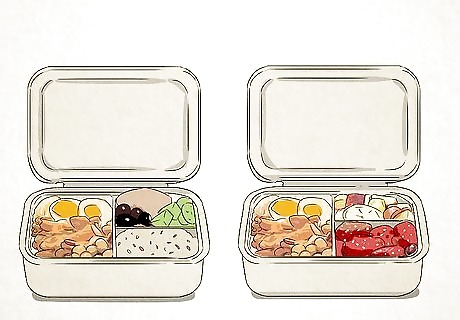
Prep meals ahead of time to save on eating out. Create bento boxes with a bit of protein, a fun snack, and a fresh, healthy food to add variety for picky eaters. Try assembling yogurt parfaits or salads in a jar for a variation on the classic boxed lunch. Make pre-made sandwiches with deli meat, cheese, lettuce, and your favorite spread. Use pita pockets instead of bread for a lower mess, on-the go sandwich. Top mixed greens with cold rotisserie chicken, tomatoes, cucumbers, and feta. Make pasta salad ahead of time. Add in homemade baked goods like muffins and scones for a budget-friendly treat.
Fill a cooler with whole foods.
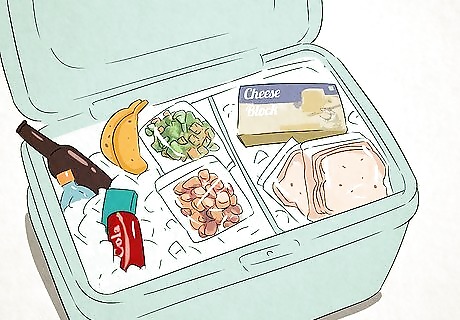
Healthy foods are often cheaper than processed snacks. Plus, fiber-rich foods like vegetables and protein-rich snacks like hardboiled eggs keep you full for longer. That way, you don’t have to keep chowing down junk food. Bring a block of cheese rather than buying processed, pre-sliced cheese. Buy fresh fruit as a cheaper, sweet alternative to candy and dried fruit. Bring your favorite snacking veggies like celery, snap peas, and carrots. Eat them with your favorite dip (hummus, ranch, etc.).
Bring your own beverages.
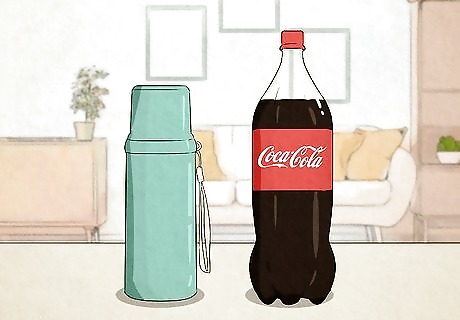
Cut down spending on coffee, soda, and alcohol. Fill a thermos with coffee before you hit the road. Either buy soda in bulk ahead of time or skip the soft drinks altogether. Carry multiple reusable water bottles with you, and fill them up at rest stops to stay hydrated. Consider buying a small coffee press and bringing your own ground coffee if you’ll be able to heat up water. Skip ordering alcoholic drinks when you’re out at restaurants.
Buy in bulk for longer road trips.
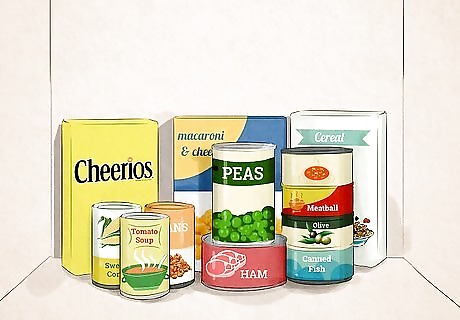
Save money over several days with this strategy. Pick up your road trip snacks and staples in larger quantities. Then, pre-portion out meals and snacks for the days of your trip so you’re not tempted to eat everything in one sitting. Here are some great foods to buy in bulk: Canned goods (like tuna) Dry goods like beans and rice (which you can cook in advance) Cereal Family-sized bags of your favorite snacks Pick generic brands for even more savings!
Purchase day-old goods.

Scope out local bakeries or the discount section of the grocery store. They’ll often have a rack of day-old or out-of-season goods that are 1-2 days past their sell-by date. For day-old goods, you won’t sacrifice much in flavor, but you’ll pay a fraction of the price.
Create quick grocery store meals instead of eating out.

Pick up staples for healthy, cheap options while you’re on the road. Opt for no-fuss choices like bread, peanut butter, fruit, and cheese to create a satisfying picnic lunch or dinner. Buy squeezable applesauce, yogurt tubes, and veggies with single serve hummus or dip for easy grocery-store snacks. Buy from ethnic markets or bulk stores for even more savings on groceries. For breakfast, opt for choices like cold-soaked oats, premade hardboiled eggs, bread with jam or butter, and yogurt. For lunch, pick up your favorite deli meat, bread, and some leafy greens for a cheap sandwich option. For dinner, snag a cooked rotisserie chicken and some mixed greens, or make a hummus wrap with veggies and beans for a vegetarian option.
Use apps and the internet to find restaurant deals.
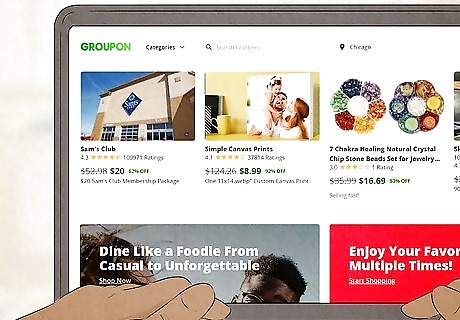
Why pay full price at restaurants? Check sites like Groupon to find deals on food near you. Before you go to a restaurant, follow them on social media and check their feed/website to see if they’re offering any special promotions.
Find cheap local restaurants.

Ask locals for recommendations so you avoid the tourist traps. Check sites like Yelp or Trip Advisor before you go to a restaurant so you can read reviews and know the approximate cost of a meal. Go for street food to save money and enjoy local ambience at the same time.
Plan your food stops ahead of time.
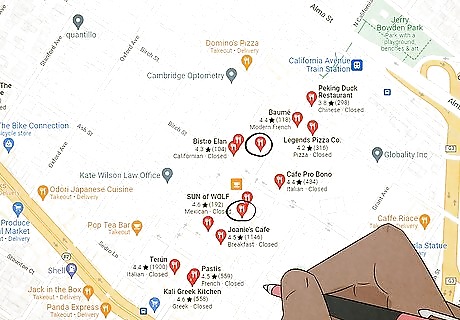
Give yourself a better range of options and price points for food. When someone in the car starts saying “I’m hungry!” it’s easy to want to pull over at the nearest restaurant or store. But that fast option might not be the most affordable. Use the “add a stop” feature on your phone GPS to search along your route for convenient, budget-friendly stops.
Share your meals at restaurants.

Order family style and reduce the number of entrees you order. Sharing meals lets everyone try something different while cutting down on food waste from large restaurant portions. Alternatively, get your meals to go and split them into portions so you can get multiple servings out of each restaurant meal.
Eat out during cheaper times.

Get lunch instead of dinner, or eat early. Lunch is usually cheaper than dinner at restaurants, and you can save big by going for happy hour deals and early bird specials. If it’s in your budget, why not allow yourself to enjoy a meal out? You’re just going to do it the smart way!
Stay at places where breakfast is included.
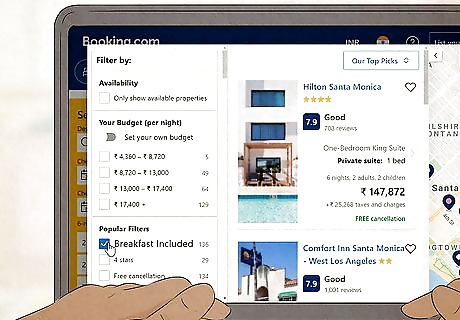
Combine your food and lodging costs for one meal. Since many breakfasts offer all-you-can-eat style buffets, you can even sneak a snack for the road. Don’t forget to fill a travel mug with hotel coffee before you hit the road.
Find accommodations with a kitchen.
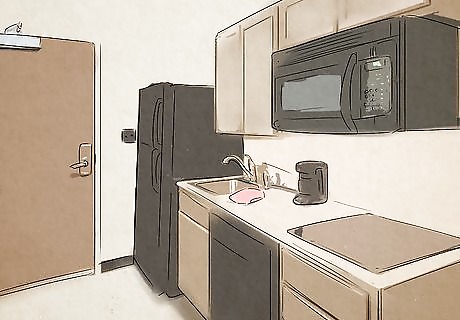
At the very least, look for a microwave to heat up food. Carry meals that are easy to heat up like dry noodles, canned food, and soup mixes. If you’re lucky enough to have a full kitchen where you’re staying, stop by the grocery store and pick up a cheaper cut of meat (like chicken thighs instead of breasts) and frozen or canned veggies to keep the savings going.
Eat less meat.
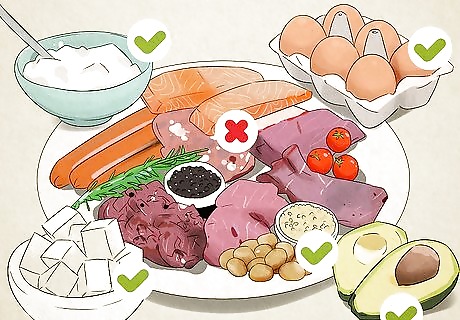
At restaurants and in your meal prep, opt for non-meat protein sources. Try swapping a can of beans for an animal protein source, and you’ll save roughly $5. Try out these meatless options to cook and keep in your cooler: Yogurt Eggs Tofu Lentils and beans Nuts and seeds




















Comments
0 comment